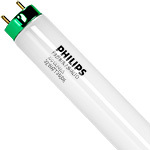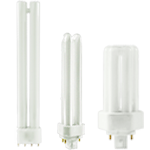Fluorescent Light Bulbs
Fluorescent light bulbs are an efficient alternative to traditional incandescent bulbs. They use less energy to deliver the same amount of light output as incandescents, helping you save on your electricity bill. They are available in a wide variety of types, shapes, color temperature, and wattage options. Fluorescents also tend to be brighter than traditional incandescent light bulbs since most of their energy is converted into light and not heat.
Fluorescents operate by converting ultraviolet (UV) light into visible light. The glass envelope is coated with a phosphor coating, then the lamp is filled with mercury-vapor gas. When the electric current passes through the lamp, the gas is excited into producing UV light. As the UV light is produced, it's causes the phosphor coating to glow, which in turn produces visible light.
Fluorescent Tubes
Fluorescent tubes come in a variety of types, including linear tubes (the most popular), circline, and U-bend. Depending on the makeup of the phosphor coating on the envelope, linear fluorescents can provide a higher color rendering index (CRI) to help color appear more natural. The 800 series have CRIs in the 80s while the 900 series have a high CRI of 90 or higher. Thought LED replacements are available, fluorescent bubs are still commonly used in warehouses, workshops, retail stores, and commercial offices.
Compact Fluorescent Lamps
Compact fluorescents, or CFL bulbs, are miniature versions of fluorescent lights. They are a more energy efficient replacement for standard incandescent light bulbs, and come in a variety of Kelvin options, shapes, wattages. The most common shape for CFLs are "spiral" light bulbs. Other shapes, such as globes and candelabra bulbs, are created using globes to cover the spiral tubes. CFL bulbs can have either a medium (E26), candelabra (E12), or GU24 base type.
Like traditional fluorescent tubes, CFL bulbs require a warm up period. They should not be used in applications where they will be paired with photocells, occupancy sensors, or vacancy sensors, as the repetitive on-off cycles can shorten the bulb's life span.
Plug-In CFL Bulbs
First developed by Philips Lighting, plug-in CFL bulbs are commonly used in schools, offices, retail stores, and other similar commercial settings. Compact fluorescent bulbs typically come in a twin-tube, quad-tube, or spiral shape, and have either a 2-pin or 4-pin base. These bases were used to ensure that building owners could not replace their lighting with less efficient lighting once they passed inspection. Plug-in CFL bulbs are commonly used in recessed cans and wall sconces, and ceiling fixtures.
CFL GU24 Twist and Lock Lamps
CFL GU24 twist and lock lamps were designed as a replacement for medium (E26) base bulbs and can only be used in GU24 sockets. The base of these CFL bulbs has two pins that extend from the bottom. When inserted into the socket, the bulb twists and locks into place. GU24 CFL bulbs typically have a spiral shape.
For help finding the right fluorescent lights for you application, call 1-800-624-4488 to speak with one of our lighting experts.




